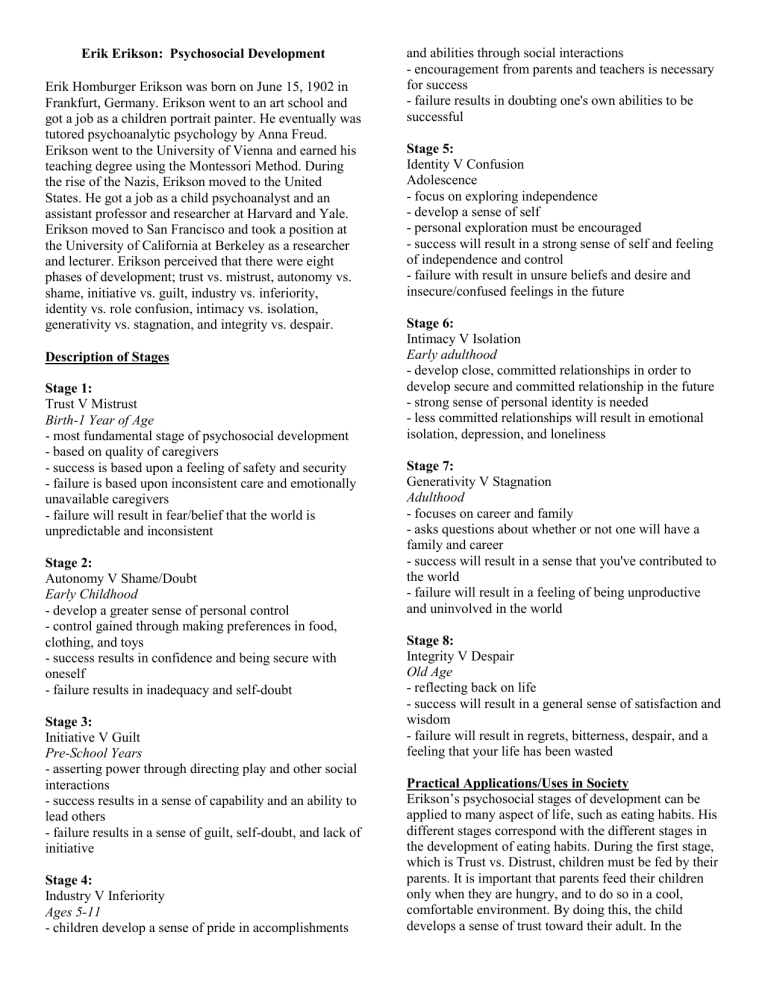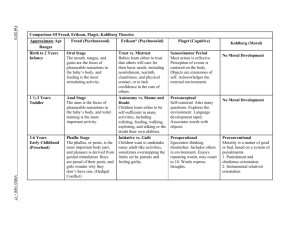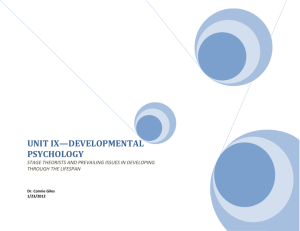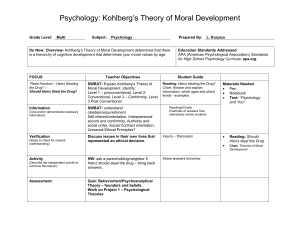Erikson & Freud: Psychosocial & Psychosexual Development

Erik Erikson: Psychosocial Development
Erik Homburger Erikson was born on June 15, 1902 in
Frankfurt, Germany. Erikson went to an art school and got a job as a children portrait painter. He eventually was tutored psychoanalytic psychology by Anna Freud.
Erikson went to the University of Vienna and earned his teaching degree using the Montessori Method. During the rise of the Nazis, Erikson moved to the United
States. He got a job as a child psychoanalyst and an assistant professor and researcher at Harvard and Yale.
Erikson moved to San Francisco and took a position at the University of California at Berkeley as a researcher and lecturer. Erikson perceived that there were eight phases of development; trust vs. mistrust, autonomy vs. shame, initiative vs. guilt, industry vs. inferiority, identity vs. role confusion, intimacy vs. isolation, generativity vs. stagnation, and integrity vs. despair.
Description of Stages
Stage 1:
Trust V Mistrust
Birth-1 Year of Age
- most fundamental stage of psychosocial development
- based on quality of caregivers
- success is based upon a feeling of safety and security
- failure is based upon inconsistent care and emotionally unavailable caregivers
- failure will result in fear/belief that the world is unpredictable and inconsistent
Stage 2:
Autonomy V Shame/Doubt
Early Childhood
- develop a greater sense of personal control
- control gained through making preferences in food, clothing, and toys
- success results in confidence and being secure with oneself
- failure results in inadequacy and self-doubt
Stage 3:
Initiative V Guilt
Pre-School Years
- asserting power through directing play and other social interactions
- success results in a sense of capability and an ability to lead others
- failure results in a sense of guilt, self-doubt, and lack of initiative
Stage 4:
Industry V Inferiority
Ages 5-11
- children develop a sense of pride in accomplishments and abilities through social interactions
- encouragement from parents and teachers is necessary for success
- failure results in doubting one's own abilities to be successful
Stage 5:
Identity V Confusion
Adolescence
- focus on exploring independence
- develop a sense of self
- personal exploration must be encouraged
- success will result in a strong sense of self and feeling of independence and control
- failure with result in unsure beliefs and desire and insecure/confused feelings in the future
Stage 6:
Intimacy V Isolation
Early adulthood
- develop close, committed relationships in order to develop secure and committed relationship in the future
- strong sense of personal identity is needed
- less committed relationships will result in emotional isolation, depression, and loneliness
Stage 7:
Generativity V Stagnation
Adulthood
- focuses on career and family
- asks questions about whether or not one will have a family and career
- success will result in a sense that you've contributed to the world
- failure will result in a feeling of being unproductive and uninvolved in the world
Stage 8:
Integrity V Despair
Old Age
- reflecting back on life
- success will result in a general sense of satisfaction and wisdom
- failure will result in regrets, bitterness, despair, and a feeling that your life has been wasted
Practical Applications/Uses in Society
Erikson’s psychosocial stages of development can be applied to many aspect of life, such as eating habits. His different stages correspond with the different stages in the development of eating habits. During the first stage, which is Trust vs. Distrust, children must be fed by their parents. It is important that parents feed their children only when they are hungry, and to do so in a cool, comfortable environment. By doing this, the child develops a sense of trust toward their adult. In the
Autonomy Vs. Shame and Doubt stage, children acquire a greater sense of self control. Children should be allowed to attempt to feed themselves, regardless of whether they make a mess. They may refuse a food, or attempt to combine them, and should not be discouraged.
As they grow, the toddlers enter the Initiative vs. Guilt
Stage. As its name state, kids began to take more initiative. They will begin to try new foods, serving themselves, and deciding whether they are full. Finally, children enter the last stage that is related to eating habits, which is the Industry vs. Inferiority Stage.
Adolescents feel capable of fulfilling their own needs.
They can discern whether they are hungry, and satisfy themselves. Kids can begin assisting in the formation of menus and can even help prepare foods. The development of eating habits in young men and women can be traced using Erikson’s Stages of Psychosocial
Development.
Related Articles:
"Erik Erikson: ages, stages, and stories. (Changing
Perceptions of Aging and the Aged)" by Steven Wieland
The article is about how Erikson came up with the theory.
Questions:
1) During the first stage of development, what should parents emphasize for their child?
2) If a child has too much guilt during stage two (early childhood) what can happen as a result?
3) How do pre-school children assert their power?
4) Why is the first stage the most important?
5) Which stage (if successfully completed) results in a feeling that you've contributed to the world?
6) As an adult, Mary is able to successfully live alone with no intervention from parents or family. This is a most likely a result of what stage?
Sigmund Freud: Psychosexual Development
Sigmund Freud was an Austrian scientist well known as the founder of Psychoanalysis which is primarily devoted to the study of human psychological functioning and behavior. He also created theories to explain human development relating to how the mind works. Freud's theory of Psychosexual Development is one of the most controversial theories in psychology today and is often discredited. In this theory, Freud suggests that the driving force behind behavior is Libido, which is psychosexual energy. Healthy personalities are a result of successful completion of the five psychosexual stages.
Description:
Oral Stage (first 18 months of life): infant’s primary source of interaction occurs through the mouth, so the rooting and sucking reflex is especially important. This stage is responsible for pleasure from oral stimulation.
During this stage, the infant also develops qualities such as trust and comfort with its caretakers because they feed it.
Anal Stage (late infancy to 1.5-3 years of life): During this stage, the child’s primary focus is on controlling the bowel and bladder movements. This is the stage where toilet training is important to the child’s development.
Success in this stage is heavily weighted on the way parents approach toilet training. Freud says that if parents are too lenient during toilet training, children can have a wasteful of destructive personality (analexpulsive personality). His theory also says that if parents are too strict or starting training too early, the child can become orderly, rigid, and obsessive (analretentive personality).
Phallic Stage (early childhood-3 to 6 years of life): the primary focus of the libido is on the genitals. This is when children discover the differences between males and females. The Oedipus complex plays into this part of the theory. The Oedipus complex explains boys’ angst toward their fathers and the desire to replace them in their mother’s eyes. Boys often fear that their fathers will discover these feelings and physically castrate them.
This fear is called Castration Anxiety. Freud’s theory explains a similar reaction in girls called the Electra
Complex, or informally, Penis Envy, in which they acquire a physical attraction to their fathers and become envious of their mother.
Latency Stage (middle and late childhood-from six to puberty) : Sexual energy in the Latent Period is still present, but the mind becomes more focused on other things in their lives, such as peer relationships, hobbies, and other interests. Social and communication skills and self-confidence are key in a child’s development during this stage.
Genital Stage (Puberty-Adulthood): This is the final stage in psychosexual development. During this time, the individual develops a strong sexual interest in the opposite sex. Interest in the welfare of others grows during this stage. If the other stages have been completed successful, the individual should now be well-balanced, warm and caring. The main goal during this time is to gain a balance in different aspects of life.
Key Notes:
Freud emphasized that a child's first five years were the most important years to social and personality development.
Gratification has a big role in a child's development, as well as the child's parents. Conflicts occur when the child's gratification is put off by the parents, who decide when, where, and how gratification is granted. Problems can occur if the parents give in to every want and need of the child or never give the child what they want or need. Balance is very important.
This theory is often discredited by many psychologists.
Practical Applications:
This theory is often criticized and discredited by many psychologists, so not many psychologists use it as an application in patients today. The biggest criticism of
Freud's theory is that it is very sexist. When Freud created this theory, psychologists say that he used a lot of introspection, and looked mostly at how he developed as a child. Psychologists also say that Freud had trouble relating to and relaying female desires. Freud even admitted to not fully understanding female sexuality.
Because of this lack of knowledge, Freud did not have much hope that his theory would be believed in psychology. Scientist say that Freud's psychosexual are plausible and can be observed in children, they are not determined to happen.
The most applicable part of Freud's psychosexual theory is said to be observed during the Phallic Stage, concerning the Oedipus Complex. The Oedipal Complex came from Socrates' story Oedipus, in which the main character, Oedipus, unknowingly falls in love with his mother and then gauges his eyes out when he finds out.
This proposed theory is often applied in psychology when a small child develops an unusual attraction to one of their parents, just as Freud's theory states.
A modern day example of this theory can be presented in the recent movie "Grown Ups" Staring Adam Sandler. In the movie, there is a 4 year old child who still breastfeeds from his mother. Throughout the movie he is always at his mother's side, and always demanding milk.
It is clear he has a strong feeling for his mother, and can be seen as being selfish and protective. This, itself, is an example of the Oedipus Theory. Near the end of the movie, the boy is denied his mother's milk by his father, and is made to drink regular milk. The boy then proceeds to say "I am just like daddy" which is the stage of the Oedipus theory where the child internalizes the rules of his father, and identifies with his father figure.
Related Articles: http://psychology.about.com/od/profilesofmajorthinkers/ p/freudprofile.htm
Small Biography on Sigmund Freud http://media.www.jhunewsletter.com/media/storage/pap er932/news/2001/11/02/News/Mchugh.Discusses.Oedip
al.Complex-2247468.shtml
Dr. Paul McHugh, retired director of psychiatry and behavioral sciences at the Johns Hopkins School of
Medicine discusses the oedipal complex http://findarticles.com/p/articles/mi_m1200/is_n16_v140
/ai_11515981/
Bruce Bower discusses the Oedipus Complex http://www.ncbi.nlm.nih.gov/pubmed/2375259
This article evaluates psychosexual behaviors in females http://jhmas.oxfordjournals.org/content/56/1/3.extract
This is an article from the New York times that observes crime in the United States using Psychosexual
Development with men as subjects
Questions:
1. What are the 5 stages of Psychosexual development according to Freud?
2. What is the Oedipus Complex?
3. According to Freud, personality is mostly established by what age? a) 5 b) 10 c) 15 d) 20
4. What energy did Freud believe was the driving force behind behavior? a) Motivation b) Stress c) Libido d) Drive
5. This term refers to Freud's idea that boys have an unconscious desire to possess their mother. a) Castration Anxiety b) Oedipus Complex c) Penis Envy d) Electra Complex
6. Around what age are your desires oriented towards your lips and your mouth?
7. The number one criticism of this theory is that it is: a) racist b) generally prejudice c) sexist d) none of the above http://psychology.about.com/od/psychoanalytictheories/l
/bl_psychosexual_quiz.htm take this quiz!
References:
Cherry, Kendra. "Freud's Stages of Psychosexual
Development - What Is Psychosexual Development."
Psychology - Complete Guide to Psychology for
Students, Educators & Enthusiasts . 2010. Web. 08 Nov.
2010.
<http://psychology.about.com/od/theoriesofpersonality/s s/psychosexualdev.htm>.
Plotnik, Rod. Introduction to Psychology . Belmont, CA:
Wadsworth Thomson Learning, 2005. Print.
"Psychosexual Development: Criticism of Freud’s
Theory of Psychosexual Development." Psychotherapy
Resources . 31 May 2008. Web. 16 Nov. 2010. < http://www.psychotherapy.ro/resources >.
Lawrence Kohlberg: Stages of Moral Development
Lawrence Kohlberg is a well-known theorist in modern psychology. He was born in Bronxville, New York on
October 25, 1927 to a wealthy family and lived a modest life. In his younger years he was a sailor but later in life he helped smuggle Jews into Palestine. During the late
1940s and 1950s he enrolled into the University of
Chicago and finished his bachelor degree in one year.
Kohlberg stayed at the university to get his doctorate degree in 1958. At first Kohlberg wanted to become a clinical psychiatrist but soon became very interested in
Piaget's Theory of Cognitive Development. For his doctoral dissertation, he began interviewing children and adolescents on moral issues. Kohlberg gave them a scenario called "The Heinz Dilemma", which asks if a man with no money is morally right or wrong for stealing drugs that would help his ill wife. From the interviews he was able to develop his theory that has become quite well-known: Kohlberg’s stages of moral development. The esteemed theorist died in 1987 of a possible suicide stemming from depression that was the result of a contracted tropical parasite in 1971 while doing cross-cultural work in Belize.
Description
Kohlberg observed that growing children advance through definite stages of moral development in a manner similar to their progression through Piaget's well known stages of cognitive development. His observation and testing of children and adults, led him to theorize that human beings process consecutively from one stage to the next in an invariant sequence, not skipping any stage or going back to any previous stage. These are stages of thought processing implying qualitatively different modes of thinking and of problem solving at each stage.
Kohlberg's Levels and Stages of Moral Development :
Level 1 Preconventional Morality (Very weak understanding of right and wrong)
Stage one
(Obedience and Punishment) , is the earliest stage of moral development and is especially common in young children, but adults are also capable of expressing this type of reasoning. During this stage, children see rules as fixed and absolute; obeying the rules is important because it is a means to avoid punishment.
During stage two (Individualism and Exchange), children account for individual and personal points of view based on what they need. In the Heinz Dilemma, children argued that the best course of action was the choice that best-served Heinz's need. Reciprocity is possible, but only if it serves one's own interest.
Level 2 Conventional Morality ( Decision making and reasoning focused on following rules and what is generally accepted)
Stage three (Interpersonal Relationship) , often referred to as the "good boy- good girl" orientation, is focused on living up to social expectations and roles.
There is an emphasis on being "nice" and consideration of how choices influence relationships.
Stage four (Maintaining Social Order) , people begin to consider society as a whole when they are making judgments. The focus is on maintaining law and order by following the rules, doing one's duty, and respecting authority.
Level 3 Postconventional Morality (Able to fully discern the meaning and consequences of actions and make decisions accordingly)
Stage five (Social Contract and Individual Rights) , people being to account for differing opinions and beliefs of others around them. Rules of law are important, but people should also agree as a society, on these standards.
Stage six (Universal Principles) , it is based upon universal principles and reasoning. During this stage, people follow these internalized principles, even if they interfere with the rule and laws.
Stage six has been omitted in newer versions of
Kohlberg's theory since too few people have reached it.
Stage five and six are the hardest to reach for people and only a few adults reach the post conventional level.
PRACTICAL APPLICATION/USES IN SOCIETY:
Teachers frequently apply Kohlberg's Theory to their classroom discussions in order to help students reason on a higher level of morality. In addition to influencing
curricular instruction and teaching strategies, Kohlberg's
Theory is often implemented by counselors attempting to explain a client's moral processing and lawyers justifying client’s criminal actions. In 1979 James Rest used Kohlberg's Theory in order to create the Defining
Issues Test, which is a pencil-and-paper alternative to the Moral Judgment Interview test. The (DIT) is commonly used to determine the morality of politicians, doctors, clergy and other decision- making workers.
Related Articles
Kohlberg's Stages of Moral Development
This article explains the development of moral reasoning.
Moral Development: Knowing Right from Wrong
This article judges bad behavior by the amount of damage caused by a person's behavior.
Questions:
1. What are the three levels of Kohlberg's moral development?
2. What stage of Kohlberg's theory of moral development is unattainable to most humans? Why is this so?
3. Which theorist did Kohlberg rely heavily upon to derive his own theory?
4. What is "The Heinz Dilemma"? Why is Kohlberg's
Theory not possible without it?
5. A four year old child understands that he can't run into the street, but he doesn't know why, he only knows that doing so will result in his mother yelling at him. What level of moral development is the described child currently at and why doesn't the boy run in the street?
6. In your opinion, what level of moral reasoning and development do you think most adults are at?
Sources
"Who Is Lawrence Kohlberg?" Wise GEEK: Clear
Answers for Common Questions. Web. 04 Nov. 2010.
<http://www.wisegeek.com/who-is-lawrencekohlberg.htm>.
Cherry, By Kendra. "Moral Development - Kohlberg's
Theory of Moral Development." Psychology - Complete
Guide to Psychology for Students, Educators &
Enthusiasts. Web. 04 Nov. 2010. http://psychology.about.com/od/developmentalpsycholo gy/a/kohlberg.htm.
Kohlberg's Stages of Moral Development: Facts,
Discussion Forum, and Encyclopedia Article."
AbsoluteAstronomy.com. Web. 05 Nov. 2010. http://www.absoluteastronomy.com/topics/Kohlberg's_st ages_of_moral_development.
Two, By Stage. "Lawrence Kohlberg Biography |
BookRags.com." BookRags.com | Study Guides, Lesson
Plans, Book Summaries and More. Web. 09 Nov. 2010.
<http://www.bookrags.com/biography/lawrencekohlberg-soc/>.
Kohlberg's Stages of Moral Development http://faculty.plts.edu/gpence/html/kohlberg.htm"KOHL
BERG'S STAGES OF MORAL DEVELOPMENT."
Pegasus Web Server Home Page. Web. 08 Nov. 2010.
<http://pegasus.cc.ucf.edu/~ncoverst/Kohlberg's Stages of Moral Development.htm>.
"Moral Development in Business | EHow.com." EHow |
How To Do Just About Everything! | How to Videos &
Articles. Web. 09 Nov. 2010. http://www.ehow.com/about_6327963_moraldevelopment-business.html




